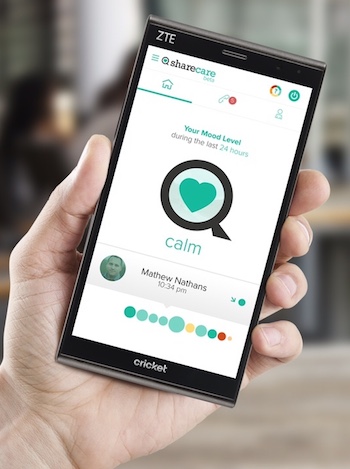 Atlanta-based Sharecare, the health and wellness engagement platform founded by WebMD founder Jeff Arnold and television personality Dr. Mehmet Oz, has acquired Germany-based Feingold Technologies, a company that offers software that analyzes human behaviors.
Atlanta-based Sharecare, the health and wellness engagement platform founded by WebMD founder Jeff Arnold and television personality Dr. Mehmet Oz, has acquired Germany-based Feingold Technologies, a company that offers software that analyzes human behaviors.
The financial terms of the deal were not disclosed. Feingold Technologies closed an undisclosed Series A round in October 2014 led by Thomas Putter, the founder of Ancora Finance Group.
“As part of our strategy to create the comprehensive health profile for every consumer regardless of where they are on their health journey, it is critical we find new ways to help people be mindful of their health every day without disrupting their daily routine,” Arnold said in a statement. “With more mobile phones on the planet than people, we believe strongly that harnessing the power of the phone is critical to achieving this, and Feingold Technologies’ advanced voice and text analysis, correlated with data from various mobile sensors, introduces a whole new level of possibilities.”
Feingold has developed technology that aims to understand human behavior, mindsets, and emotional states. The company has discovered a series of patterns in voice and text communications that correlate to certain emotional expressions, Feingold explains. Based on this research, Feingold created a "framework" to help consumers understand their mindset so that they can reduce stress, refocus, and improve their personal relationships and productivity.
Many larger companies in the logistics, pharmaceutical, and financial industries, including DHL, Merck (MSD), and Boehringer Ingelheim are using Feingold’s business apps, iCoach and StressControl.
As part of the acquisition, Feingold Technologies offices, in Berlin and Munich, will operate under Sharecare, effective immediately, the company said. Feingold's team will work with Sharecare’s existing product and technology teams to create mobile products and apps that help people optimize their productivity. Feingold Technologies’ founder and CEO Erik Feingold has joined Sharecare as its Chief Innovation Officer, based at Sharecare's Atlanta headquarters.
The first such offering of the acquisition has already launched in a closed beta for Android devices. The offering is an app, which offers somewhat similar functionality to Ginger.io. The app monitors the tone in the user's voice when the user speaks on their smartphone and then uses this data to identify the user’s mindset and stress type, like "worry" or "irritation".
After each call, the app will show users a color representation of the intensity and stress type that the app detected during the call as well as a description of the user's mindset. The color will range from a calm “green” to an intense “red”. Within the app, users will also be able to access a dashboard showing how their results change over time, per call, and per contact.
The app is currently available through a crowd-sourced year-long trial that Sharecare is conducting. CNN Chief Medical Correspondent and practicing neurosurgeon Sanjay Gupta is the chief architect for the trial and will oversee its clinical validity. The Institute for People and Technology at Georgia Tech will oversee the trial’s protocol and analysis. The researchers aim to study how providing people with feedback on their stress level, behaviors, and relationships, analyzed through the tone of their voice, could help them make positive changes and reduce stress. The findings from the trial will be shared at the 2016 Lake Nona Impact Forum, a Johnson and Johnson event. Speakers of this year's forum received a beta version of the app preloaded on an Android phone, the ZTE Grand X Max+.
This is Sharecare's second app. The first, called AskMD, which launched in December 2013, offers users a symptom checker that allows them to choose which symptoms they are feeling and then see which potential health issues they might have. The app then walks the user through a ‘consultation’ in which the app will ask the user a series of questions to identify more specifically what the symptom feels like, when it started, and if there are any other symptoms accompanying it. After the ‘consultation’, the user can enter in any information about medications that they are taking. When users have finished entering information, AskMD generates a list of potential problems the user might have ordered by the commonality of the potential problems.
Sharecare has acquired two other companies in the last few years.
In November 2014, Sharecare acquired QualityHealth, a patient identification and engagement platform that works with health systems and pharmaceutical companies, for an undisclosed sum. QualityHealth was kept more or less intact so that its 50 million member database could help Sharecare scale its other offerings.
At the time, MobiHealthNews pointed out that Sharecare was increasingly looking to B2B partnerships with providers to get its products, like AskMD, into the hands of more users. Last month it partnered with CHE Trinity Health, one of the largest not-for-profit healthcare systems in the US, to equip its 30 million patients in 20 states with Sharecare’s portfolio of patient engagement tools.
And in January 2012, Sharecare acquired The Little Blue Book (TLBB), a popular reference tool for physicians, from Galen Partners and other investors in exchange for shares in Sharecare.
Update: To date, Sharecare has raised more than $120 million. In September 2013 the company announced they had raised $91 million since launching, and last month, Sharecare received an additional investment from Hospital Corporation of America (HCA), a company that manages 164 hospitals and 114 freestanding surgery centers in 20 states and England.

















